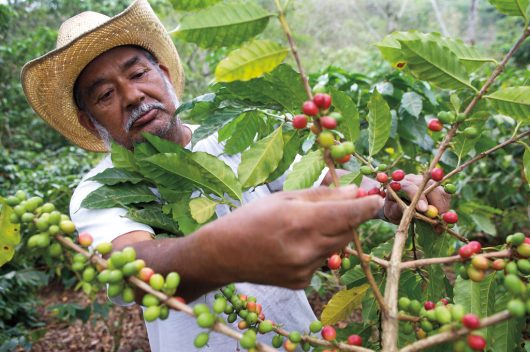Protecting Coffee Farmers Across the Globe

The exponential rise in demand for coffee has led to insuperable pressure on coffee farmers all over the world. The 22 percent decrease in global coffee exports has adversely impacted the supply of coffee as climate change patterns continue to debilitate.
The major cause of the decrease in supply lies in the rapidly rising global temperatures. This temperature spike has culminated in poor yields as the coffee plants thrive on more moist and cooler conditions for flowering and fruiting. If not, the crop becomes more vulnerable to the combined effects of pests and various diseases.
Consequently, a large proportion of coffee growers in developing economies in African countries, Brazil, Colombia and India are smallholder farmers. Protecting coffee farmers is especially essential because they do not have the means to support and adapt to the changes in the market, especially during the concurrent price volatility for coffee. There are around 120 million individuals who rely on this produce for their livelihoods.
A recent report consolidated by Australia’s Climate Change Institute highlighted that by the year 2050, 50 percent of the land dedicated to growing coffee would shrink. This will lead to negative impacts on yields.
Protecting the coffee farmers is vital to ensure continued production of coffee to meet the increasing demand. Using sustainable practices and approaches will be instrumental in achieving this goal, along with carefully monitoring supply chains. Many organizations have therefore recognized the need of addressing this key objective.
The 15-year collaborative effort that Conservation International has embarked on with Starbucks, with the establishment of the CAFE (Coffee and Farmer Equity) practices program, has been a pillar of strength to coffee growers. Moreover, the concept of Ethical Sourcing has brought about the inception of the components: Quality, Social Responsibility, Economic Accountability and Environmental leadership. These initiatives will ensure that coffee growers have an efficient way of sustaining their produce every year.
The Smart Coffee ID Card has also helped in protecting the coffee farmers in Colombia. Through this scheme, farmers get a chance to make payments effectively. Digitizing payments has been proved to stimulate more financial and social inclusion within communities to help combat poverty, as accentuated by the U.N. led coalition, Better Than Cash Alliance.
Fortunately, this channel is now also being used for the provision of government subsidies and incentives. From 2007- 2014 alone, a record 5.4 million payments were made.
Moreover, the Kagera Co-operative is also protecting coffee farmers. It has a widespread influence in Tanzania and reaches out to 60,000 smallholder farmers who aspire to sell their products on the fair trade market. Fair trade Coffee Cooperatives have a massive outreach with a renowned reputation for alleviating trading and price restrictions, along with granting workers considerable autonomy.
Overall, protecting coffee farmers effectively can be achieved by the concerted efforts of the coffee farmers, governments, local charities and international organizations so that coffee farmers continue to have an outlet for their produce and can earn high returns. Collaboration in this manner will pave the way for a sustainable future, where conservation, farming practices and livelihoods are all safeguarded.
– Shivani Ekkanath
Photo: Flickr
